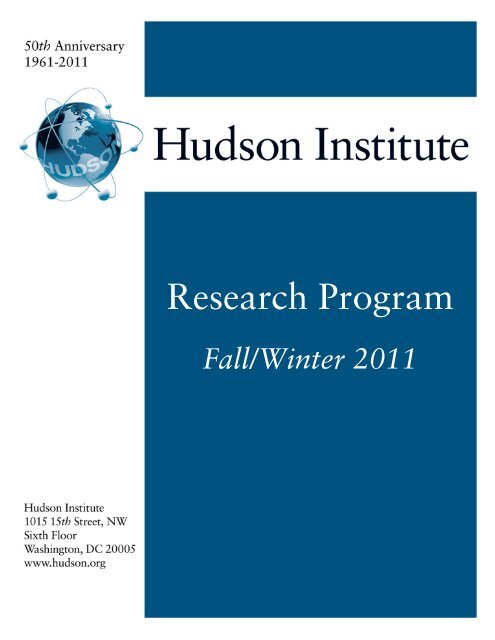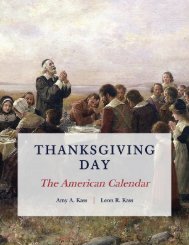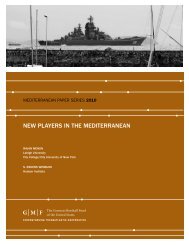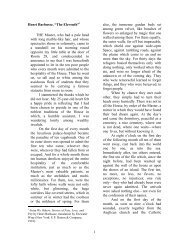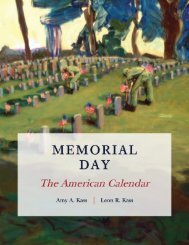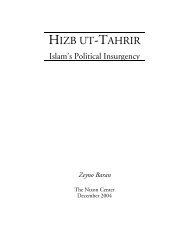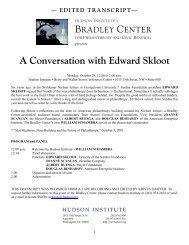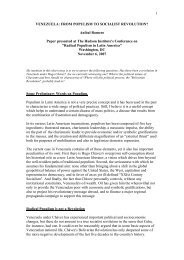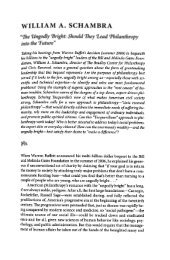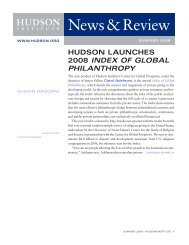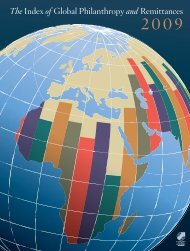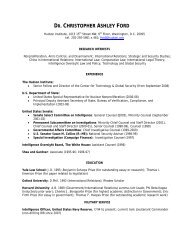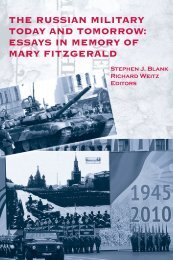Download PDF - Hudson Institute
Download PDF - Hudson Institute
Download PDF - Hudson Institute
Create successful ePaper yourself
Turn your PDF publications into a flip-book with our unique Google optimized e-Paper software.
Research Program<br />
Fall/Winter 2011
Table of Contents<br />
About <strong>Hudson</strong> <strong>Institute</strong> .............................................................................................. i<br />
International Security and Foreign Affairs ........................................................ 1<br />
Promoting American National Security .......................................................................... 1<br />
Defeating the Threat of Radical Islam ............................................................................ 3<br />
Facing a Rising Asia ....................................................................................................... 4<br />
Advancing U.S. Interests in the Americas ....................................................................... 5<br />
Building Vibrant Civil Societies and Democracies across the Globe ............................ 5<br />
Religious Freedom and Human Rights ................................................................ 7<br />
Religious Freedom .......................................................................................................... 7<br />
Freedom of Speech .......................................................................................................... 7<br />
Human Rights.................................................................................................................. 8<br />
Eye on the UN ................................................................................................................. 8<br />
Economic, Health, and Innovation Policy Studies ........................................... 9<br />
Fostering Innovation ....................................................................................................... 9<br />
Building a More Competitive Economic Environment ................................................... 9<br />
E-Government ............................................................................................................... 10<br />
Energy Policy ................................................................................................................ 10<br />
Health Care and Biotechnology Policies ...................................................................... 10<br />
Economics of the Internet ............................................................................................. 10<br />
Housing and Financial Markets ................................................................................... 11<br />
The Future of the Automotive Industry ......................................................................... 11<br />
Food Policy ................................................................................................................... 11<br />
Obesity Solutions Initiative ........................................................................................... 11<br />
Philanthropy, Society, and Culture ..................................................................... 12<br />
American Identity .......................................................................................................... 12<br />
Philanthropy and Civic Renewal .................................................................................. 13<br />
Culture and the Rule of Law ......................................................................................... 13<br />
<strong>Hudson</strong> <strong>Institute</strong> Leadership ................................................................................. 15<br />
<strong>Hudson</strong> <strong>Institute</strong> Board of Trustees .................................................................... 15
About <strong>Hudson</strong> <strong>Institute</strong><br />
This year, <strong>Hudson</strong> <strong>Institute</strong> celebrates a half century as one of America’s premier policy research<br />
organizations.<br />
Founded by the late geostrategist Herman Kahn in 1961, <strong>Hudson</strong> <strong>Institute</strong> provides policy<br />
research, insights, and analysis that advance national security, protect our liberty, and draw on<br />
the power of free markets.<br />
<strong>Hudson</strong> <strong>Institute</strong> has fifty years of proven, nonpartisan leadership in shaping critical domestic<br />
and international policies. With ties to leaders around the world, and offices in Washington and<br />
New York, <strong>Hudson</strong> projects into an uncertain future a compelling voice of reason on the great<br />
challenges of the day, including:<br />
<br />
<br />
<br />
<br />
protecting American national security and advancing the interests of the United States<br />
and its allies;<br />
securing human rights and religious freedom;<br />
promoting growth and innovation through sound, market-based economic policies; and<br />
strengthening civil society and philanthropy at home and abroad.<br />
<strong>Hudson</strong>’s experts have experience at the highest levels of government and the private sector.<br />
Decisionmakers and opinion leaders around the globe value <strong>Hudson</strong> <strong>Institute</strong>’s distinctive,<br />
forward-looking research and innovative policy solutions.<br />
<strong>Hudson</strong> scholars are frequently called to testify before congressional committees, and they<br />
organize policy conferences that help shape debates on key issues. <strong>Hudson</strong>’s staff regularly<br />
produces op-eds, white papers, briefings, journal articles, and studies that are widely circulated<br />
on Capitol Hill and in the executive branch. The <strong>Institute</strong>’s website, <strong>Hudson</strong>.org, averages more<br />
than 500,000 unique page views per month.<br />
<strong>Hudson</strong> research garners press coverage in a wide variety of high-profile global print outlets and<br />
serves as a resource for leading national and international publications. <strong>Hudson</strong> scholars offer<br />
their expertise on pressing issues on every major U.S. news channel and in a variety of foreign<br />
outlets.<br />
<strong>Hudson</strong> <strong>Institute</strong> events provide a forum for scholars to advance their work and stimulate further<br />
discussion of their ideas. Major policymakers speak at <strong>Hudson</strong> events, which attract leading<br />
experts, stakeholders, and journalists as attendees and as viewers online. In addition to public<br />
events, <strong>Hudson</strong> scholars also hold numerous private roundtable discussions, receptions, and<br />
briefings.<br />
i
International Security and Foreign Affairs<br />
<strong>Hudson</strong> <strong>Institute</strong> is a comprehensive and future-oriented policy research organization<br />
that, for fifty years, has analyzed defense and foreign policy events and trends.<br />
<strong>Hudson</strong>’s international policy scholars, many of whom have served in high-level<br />
government posts, combine strong regional competencies—in Europe, the Middle East,<br />
and Latin America, as well as Central, East, and South Asia—with knowledge of U.S.<br />
and foreign military capabilities and strategic aims.<br />
<strong>Hudson</strong> research in global affairs is conducted in five main areas:<br />
<br />
<br />
<br />
<br />
<br />
promoting American national security;<br />
defeating the threat of radical Islam;<br />
facing a rising Asia;<br />
advancing U.S. interests in North and South America; and<br />
building vibrant civil societies and democracies across the globe.<br />
Promoting American National Security<br />
America’s military forces are the world’s most technologically advanced and powerful,<br />
both because of our wealth and innovation and because of the diverse and competing<br />
requirements of U.S. national security.<br />
<strong>Hudson</strong> global affairs scholars analyze a broad but integrated range of issues central to<br />
U.S. national security, including national security strategy, defense policy and<br />
technology, maritime security and the future of the U.S. Navy, countering hostile<br />
ideologies and terrorism, nuclear proliferation and cyber threats, and intelligence law and<br />
policy.<br />
Security Strategies<br />
Strong American national security requires an integrated and cross-disciplinary<br />
understanding of grand strategy. <strong>Hudson</strong> <strong>Institute</strong>’s national security experts study the<br />
manifold threats faced by the United States, its allies, and its interests; offers forwardlooking<br />
analyses of ever-changing global security landscapes; provides realistic<br />
knowledge of U.S. capabilities, ranging from counterterrorism to high-tech warfare; and<br />
develops comprehensive and effective strategies that seek to minimize threats, leverage<br />
existing capabilities and alliances, and promote U.S. values and interests.<br />
<strong>Hudson</strong> scholars analyze these threats— from Afghanistan, Iraq, and Iran, to the Middle<br />
East, Asia, Africa, and beyond—and seek to provide a solid footing for national security<br />
1
strategies to counter them and maintain U.S. global leadership. The <strong>Institute</strong>’s team<br />
includes former senior-level officials, including Senior Vice President Lewis Libby, the<br />
former chief of staff to Vice President Richard Cheney; Senior Fellow Douglas Feith, the<br />
former Undersecretary of Defense for Policy; former Pentagon officials including, Seth<br />
Cropsey, the former Deputy Undersecretary of the Navy, Jack David, the former Deputy<br />
Assistant Secretary of Defense, Abram Shulsky, and Richard Weitz; and former Principal<br />
Deputy Assistant Secretary of State for Arms Control Christopher Ford. President and<br />
CEO Kenneth Weinstein focuses on alliance relations with Europe and Asia.<br />
Defense Policy and Technology<br />
Maintaining the American military advantage requires tapping the technological prowess<br />
of the U.S. economy, and, where necessary, the capabilities of our allies. The key to<br />
ensuring that the Defense Department can benefit from technological advances is<br />
preserving a defense-industrial base that is vibrant and technologically superior; this is<br />
possible only through competition.<br />
Competition in the defense-industrial arena has recently been impeded by a number of<br />
developments. Most notable has been the consolidation of the defense-industrial base into<br />
fewer contractors, and the reduced number of major defense programs for which they can<br />
compete. A top-down, bureaucratic procurement process does not encourage competition<br />
and will thwart efforts to ensure that our weapons systems remain at the technological<br />
cutting edge.<br />
<strong>Hudson</strong> <strong>Institute</strong> Senior Fellows—Douglas Feith, former Undersecretary of Defense for<br />
Policy, Abram Shulsky, former Pentagon analyst, Seth Cropsey, former Deputy<br />
Undersecretary of the Navy, and Christopher Ford, former Principal Deputy Assistant<br />
Secretary of State for Arms Control—analyze the political and institutional factors<br />
potentially imperiling future advances in the defense industry.<br />
Maritime Security and Strategy<br />
U.S. naval power was critical to assuring the rise of the United States as a global power.<br />
Increasing ship costs, the likelihood of decreasing naval budgets as land action against<br />
jihadists continues, and the Navy’s own declared strategy of emphasizing humanitarian<br />
assistance and disaster relief all suggest that the United States will experience increasing<br />
difficulty executing the traditional missions of a great maritime power. Led by Seth<br />
Cropsey, a <strong>Hudson</strong> Senior Fellow and former Deputy Undersecretary of the Navy,<br />
<strong>Hudson</strong> <strong>Institute</strong>’s maritime policy research focuses attention on the implications of a<br />
shrinking U.S. Navy threatened by future budget cuts, a growing Chinese navy, and an<br />
increasingly tense world, exploring the likely effect of these changes on the United<br />
States’ position as a great power.<br />
2
Proliferation Threats<br />
Following years of dramatic nuclear reductions after the end of the Cold War, the current<br />
goal of U.S. nuclear policy is to fundamentally alter the status quo. As a means to help<br />
reach this goal, the idea of countervailing reconstitution—maintaining the capacity to<br />
restart nuclear weapons programs after the elimination of all existing weapons—may be<br />
the only vehicle accepted by both supporters and detractors of the current nuclear<br />
balance. Led by Senior Fellow Christopher Ford, a former Principal Deputy Assistant<br />
Secretary of State for Arms Control, and drawing on <strong>Hudson</strong> <strong>Institute</strong>’s rich heritage of<br />
strategic nuclear research, the Center for Technology and Global Security provides<br />
comprehensive analysis of the policy merits and programmatic implications of<br />
countervailing reconstitution as an approach to continuing nuclear reductions, the<br />
possibility of achieving a world free of nuclear weapons, and maintaining an abolition<br />
regime in the face of proliferation pressures.<br />
Complementary work is done by Senior Fellow and Director of the Center for Political-<br />
Military Analysis Richard Weitz, who researches proliferation issues, and by Adjunct<br />
Fellow Shmuel Bar, who analyzes regional proliferation through the traditions, history,<br />
and current strategic thinking of Muslim and Arab culture.<br />
Intelligence Law<br />
Adjunct Fellow John Shenefield, former Associate Attorney General of the United States,<br />
analyzes the shortcomings and challenges of the 1978 Foreign Intelligence Surveillance<br />
Act.<br />
Defeating the Threat of Radical Islam<br />
Believing that the threats emanating today from the Muslim world are increasingly<br />
interconnected and global in character, <strong>Hudson</strong> <strong>Institute</strong> research focuses on the power of<br />
radical Islam and the challenges it presents to American interests; the threat of terrorism<br />
and global Jihad, and threats to U.S. allies, especially Israel; and potential U.S. policy<br />
responses.<br />
<strong>Hudson</strong> <strong>Institute</strong> research on radical Islam draws upon the expertise of Muslim and non-<br />
Muslim scholars, including Senior Vice President Lewis Libby, Research Fellow Eric<br />
Brown, Senior Fellow Maneeza Hossain, Senior Fellow Meyrav Wurmser, and Visiting<br />
Fellow’s Nibras Kazimi, Elizabeth Samson, and Lee Smith.<br />
The Center on Islam, Democracy, and the Future of the Muslim World, directed by<br />
Senior Fellow Hillel Fradkin, is the only U.S. policy program dedicated to analyzing the<br />
Muslim world as a whole and not solely specific regions and countries. This focus<br />
derives from the tendency of Muslim regimes and political movements—especially<br />
radical Islamic ones—to view themselves as global in their politics. The Center also<br />
3
undertakes research on specific regions and countries of importance to American national<br />
security interests.<br />
Current Trends in Islamist Ideology, the flagship publication of the Center, is the only<br />
journal exclusively devoted to radical Islam and its ideology. Founded in response to the<br />
terrorist attacks of Sept. 11, 2001 by Fradkin, Eric Brown, and Husain Haqqani, a former<br />
<strong>Hudson</strong> fellow who currently is Pakistani Ambassador to the United States, Current<br />
Trends is universally regarded as an authoritative source of in-depth research and analysis<br />
on the ideological dimensions of the contemporary Islamist movement. It present editors<br />
are Fradkin and Brown.<br />
Countering the ideological underpinnings of jihadist extremism is the key to reducing the<br />
threat of radical Islam. Though many researchers have considered recasting strategic<br />
communications or using other forms of “soft power,” none has come to grips with the<br />
basic question of how the United States should now organize itself now to implement<br />
strategy in this area. <strong>Hudson</strong> Senior Fellows Douglas Feith and Abram Shulsky are<br />
currently analyzing factors that will enable the United States to conduct activities to<br />
counter hostile ideologies effectively.<br />
A firm supporter of the importance of the U.S.-Israeli relationship as a part of America’s<br />
national interests in the Middle East, <strong>Hudson</strong> <strong>Institute</strong> regularly hosts public forums for<br />
such prominent Israeli officials as Ambassador Michael Oren and Ministers Moshe<br />
Ya’alon and Uzi Landau. <strong>Hudson</strong> scholars frequently write op-eds and articles asserting<br />
the importance of maintaining Israel’s security; they visit Israel to meet with its officials<br />
and conduct projects with Israeli partner organizations. <strong>Hudson</strong> <strong>Institute</strong> scholars<br />
participate in the annual Herzliya Conference, Israel’s premier defense policy forum.<br />
Adjunct Fellow Ronald Radosh, an award-winning historian, writes on Arab-Israeli<br />
relations, and U.S. policy on the Middle East.<br />
Facing a Rising Asia<br />
<strong>Hudson</strong> <strong>Institute</strong>’s research portfolio is extensive in issues relating to Asia, including<br />
geopolitics, trade, proliferation, religion, demographics, and international policy.<br />
<strong>Hudson</strong> <strong>Institute</strong> China scholars include Senior Fellows Charles Horner and Christopher<br />
Ford. They study how contemporary developments in China are influenced by the<br />
country’s evolving views of its modern historical experience and by its intellectual and<br />
cultural traditions. Horner and Research Fellow Eric Brown have paired to study China’s<br />
“New March West” and the strategic implications of Sinic-Islamic relations.<br />
<strong>Hudson</strong> scholars—including Senior Fellows Jack David, Chris Ford, and Seth Cropsey,<br />
Senior Vice President Lewis Libby, and Visiting Fellow John Lee—study U.S. strategy<br />
for the future and security of the Asia-Pacific region and South Asia, including bilateral<br />
and trilateral relationships as well as broader alliance issues in the region. Special<br />
attention is focused on countries where <strong>Hudson</strong> has a long legacy of research, including<br />
4
Japan, Korea, and Taiwan. Research Fellow Aparna Pande examines the future of India’s<br />
defense and foreign policy, its relations with Pakistan and China, and its alliance with the<br />
United States.<br />
<strong>Hudson</strong> scholarship devotes special attention to the challenge of developing a stronger<br />
framework for the United States’ bilateral relationships in the region, so that they are not<br />
wholly subsumed within, or submerged by, the larger relationship with China.<br />
Advancing U.S. Interests in the Americas<br />
The Center for Latin American Studies provides analysis of key economic, social, and<br />
political developments and trends throughout Latin America. Senior Fellow and Center<br />
Director Jaime Daremblum served as Ambassador of Costa Rica to the United States<br />
from 1998 to 2004. The Center facilitates dialogue between leaders in Latin America and<br />
the United States to advance policies that promote freedom, democracy, and economic<br />
opportunity. It focuses on critical emerging issues, including radical populist regimes; the<br />
increasing roles of China, Russia, and Iran in Latin America; the Palestinian upsurge in<br />
the region; possibilities for increased regional cooperation on energy and security issues;<br />
and avenues for improving U.S.-Latin American relations.<br />
Senior Fellow Christopher Sands specializes in Canada and U.S.-Canadian relations, an<br />
area that encompasses energy issues, the alliance relationship, and border security. John<br />
Walters, <strong>Hudson</strong>’s Executive Vice President and Chief Operating Officer, was director of<br />
the White House Office of National Drug Control Policy during the George W. Bush<br />
administration. Walters analyzes the security threat from large, violent criminal<br />
organizations operating across the U.S.-Mexico border and in Central and South<br />
America.<br />
Building Vibrant Civil Societies and Democracies across the Globe<br />
<strong>Hudson</strong> <strong>Institute</strong> is committed to the flourishing of democratic societies around the<br />
world. <strong>Hudson</strong> scholarship on society, culture, and philanthropy is guided by a<br />
fundamental understanding of, and loyalty to, the principles of liberal democracy and its<br />
key elements: respect for the rule of law, individual rights, and the integrity of civil<br />
society.<br />
<strong>Hudson</strong> scholars are involved with efforts to build and strengthen civil society in dozens<br />
of countries, and frequently travel the globe to promote these efforts. Research Fellow<br />
Eric Brown and Senior Fellow Abram Shulsky interact with Iraqi civil society figures and<br />
researchers to encourage engagement with their American counterparts on a range of<br />
topics, including the relationship between religion and politics and law and democracy,<br />
and the necessity of a strong culture of independent policy research and commentary.<br />
5
In Georgia, Senior Fellow Charles Fairbanks leads an effort to build democracy through<br />
the civic education of university students. The market-oriented liberal arts program,<br />
constructed by Fairbanks and implemented by him in Georgia during and after the<br />
Russian invasion, has resulted in record enrollments by Georgian students. Fairbanks, as<br />
well as Senior Fellows Richard Weitz and David Satter, analyze the strategic challenges<br />
posed by Russia and its looming autocracy.<br />
Under the direction of Senior Fellow Carol Adelman, the Center for Global Prosperity<br />
creates awareness of the central role of the private sector in economic growth and<br />
prosperity in the developing world. The Center produces the annual Index of Global<br />
Philanthropy and Remittances, the sole comprehensive guide to private giving to<br />
developing countries by institutions and individuals in the United States and other<br />
developed countries. Now in its sixth edition, the Index reframes the discussion about the<br />
roles of public and private sectors in foreign aid by showing that the full scale of a<br />
country’s generosity is measured not just by government aid, but by private giving as<br />
well. The Index painstakingly details the levels of U.S. and international private<br />
assistance to the developing world, which far exceed official development aid in both<br />
scale and impact.<br />
In addition to the Index of Global Philanthropy and Remittances, the Center for Global<br />
Prosperity is undertaking a new pilot index entitled A Comparative Index of<br />
Philanthropic Freedom, the first indicator-based competition in philanthropy that<br />
compares the freedom to give on a country-by-country basis. This project addresses<br />
issues central to the success of liberal democracy, including individual freedom and the<br />
integrity of civil society.<br />
<strong>Hudson</strong> Senior Fellow and Former USAID administrator Andrew Natsios examines how<br />
U.S. policy can promote stability and democracy in fragile states, focusing often on<br />
Africa.<br />
6
Religious Freedom and Human Rights<br />
<strong>Hudson</strong> <strong>Institute</strong> hosts a vibrant program that presses for religious and other fundamental<br />
freedoms and human rights. The program documents abuses of religious freedom,<br />
especially in the Muslim world, and it works to develop policies that protect human rights<br />
in a range of ways, including fighting human trafficking, reforming prisons, and<br />
combating Internet censorship.<br />
<strong>Hudson</strong> research in religious freedom and human rights is conducted in four main areas:<br />
<br />
<br />
<br />
<br />
promoting religious freedom;<br />
defending freedom of speech;<br />
protecting human rights; and<br />
exposing hypocrisy and intolerance at the United Nations.<br />
Religious Freedom<br />
The Center for Religious Freedom, Directed by Senior Fellow Nina Shea, seeks to show<br />
the centrality of religious freedom to political freedom and democracy. The<br />
Center defends individuals and minority groups persecuted for their religious beliefs, and<br />
works to promote religious freedom through U.S. foreign policy. Led by Shea and Senior<br />
Fellow Paul Marshall, the Center’s current work highlights and opposes the tyranny of<br />
Muslim blasphemy and apostasy laws, which are used to oppress Muslim reformers,<br />
converts, religious minorities, and others.<br />
The Center actively documents the religious persecution roiling the Muslim world today.<br />
Throughout the Muslim Middle East, Jews, Christians, Hindus, Zoroastrians, Bahais,<br />
Mandeans, Yazidis, and liberal Muslims are violently persecuted and often driven out of<br />
their countries en masse. State-enforced Islamic blasphemy and apostasy rules are now<br />
making an appearance in the West under the guise of so-called hate speech bans.<br />
Visiting Fellow Marcello Pera, former President of the Italian Senate, researches how<br />
Europe could reclaim its Christian culture to meet the civilizational challenges posed by a<br />
strong and growing Muslim presence.<br />
Freedom of Speech<br />
The very definition of free speech in democratic societies is under threat, as Western<br />
Europe, Canada, and Australia—whose own blasphemy laws fell into disuse decades<br />
ago—now arrest and try political leaders, cartoonists, journalists, and writers who<br />
criticize Islam. <strong>Hudson</strong> Senior Fellows Paul Marshall and Nina Shea fight the silence of<br />
7
the U.S. foreign policy establishment on the coercion of religious conformity in the<br />
Muslim Middle East and the related threat to free speech in the West.<br />
To further the free exchange of ideas and dialogue, Senior Fellow Michael Horowitz<br />
works with a broad coalition to neutralize efforts by China, Iran, and other authoritarian<br />
regimes to monitor or block their citizens’ Internet access.<br />
Human Rights<br />
Senior Fellow Michael Horowitz focuses on additional human rights issues that affect<br />
some of the most vulnerable populations in the world today, including children, rape<br />
victims, and refugees from authoritarian regimes. Horowitz builds bipartisan coalitions<br />
that seek to protect these populations by passing and implementing effective laws and<br />
policies, such as those designed to prevent international and domestic human trafficking,<br />
address prison rape and promote international prison reform, provide aid for victims of<br />
obstetric fistula, and combat Chinese support for the authoritarian regime of Kim Jong-il<br />
in North Korea.<br />
Senior Fellow Melanie Kirkpatrick is currently writing a book recounting a rare goodnews<br />
story from North Korea: the escape to freedom of a small number of its people with<br />
the help of rescuers from the United States and South Korea. Through the little-known<br />
stories of North Korean refugees and the courageous individuals who help them, she<br />
examines the failed policies of the United States, South Korea, China, and the United<br />
Nations and will recommend more humane policies designed to open up North Korea,<br />
create dissent, and change the totalitarian regime.<br />
Eye on the UN<br />
Directed by Senior Fellow Anne Bayefsky, EYEontheUN.org reports on the wide range<br />
of United Nations actions that leave human rights victims defenseless and contribute to<br />
racism, intolerance, and anti-Semitism. EYEontheUN is dedicated to making transparent<br />
the United Nation’s record on its fundamental promise—to identify, condemn, and<br />
protect against human rights violations and confront and respond to threats to<br />
international peace and security.<br />
8
Economic, Health, and Innovation Policy Studies<br />
Ever since the founding of <strong>Hudson</strong> <strong>Institute</strong> in 1961, our economic and health policy<br />
research has been shaped by a basic belief in the power and vibrancy of markets and<br />
technology to shape a better future for mankind. Driven by this future-oriented and<br />
dynamic vision, our scholars research issues ranging from digital innovation to the future<br />
of the workforce to preparedness in the face of a potential bioterrorist threat.<br />
<strong>Hudson</strong> research in economic, health, and innovation policy is conducted in nine main<br />
areas:<br />
<br />
<br />
<br />
<br />
<br />
<br />
<br />
<br />
<br />
fostering innovation;<br />
building a more competitive economic environment;<br />
making government more efficient;<br />
designing effective energy policy;<br />
promoting innovative, market-oriented health care solutions and biotechnology<br />
policies;<br />
providing market-based guidance on Internet policy;<br />
analyzing housing and financial market trends;<br />
examining the transformation of the U.S. automotive industry; and<br />
encouraging state of the art agricultural and food policy.<br />
Fostering Innovation<br />
<strong>Hudson</strong> <strong>Institute</strong> is launching a major initiative to begin a national debate about<br />
innovation strategies. The program, which leverages the talents of <strong>Hudson</strong> scholars<br />
across the breadth of the <strong>Institute</strong>, will analyze conditions favorable to America’s<br />
innovation dominance in the past; identify factors that drive or weaken American<br />
innovation today; examine the old innovation pipeline and construct a new one; spark a<br />
debate on national innovation policy; and provide a strategy to revitalize American<br />
innovation superiority, with a focus on breakthrough technologies.<br />
Building a More Competitive Economic Environment<br />
With 450 million consumers and a combined GDP of $15 trillion, North America<br />
competes with the economies of the European Union and Asia in a world where<br />
communication, technology, capital, and high-skilled labor are mobile and fluid. <strong>Hudson</strong><br />
<strong>Institute</strong>’s scholars research and publicize factors critical to ensuring a competitive<br />
environment, including regulation, taxation, border access and security, and inspection<br />
processes.<br />
9
E-Government<br />
The dramatic improvements that digital currency has created in the private sector for<br />
business and commercial transactions are catalyzing the public sector with a whole new<br />
potential for transformative results. Visiting Fellow Hanns Kuttner analyzes this critical<br />
development and the significant possibilities for digital currency applications by<br />
government at all levels.<br />
Energy Policy<br />
Senior Fellow Irwin Stelzer, Director of <strong>Hudson</strong>’s Economic Policy Studies, and Visiting<br />
Fellow Lee Lane work to examine factors shaping U.S. and global energy policy and<br />
markets, including shifting demand, challenges posed by carbon taxes and regulation, the<br />
need for realism in climate policy, the inadvisability of federal spending on green jobs,<br />
and nuclear policy in a post-Fukushima age.<br />
Stelzer, who writes on antitrust and regulatory policy, also comments on tax and other<br />
economic policy development in the United States and Britain.<br />
Health Care and Biotechnology Policies<br />
<strong>Hudson</strong> <strong>Institute</strong> scholars on health issues include Senior Fellow Tevi Troy, former<br />
Deputy Secretary of Health and Human Services, and Visiting Fellow Hanns Kuttner, a<br />
former White House health policy advisor.<br />
Troy studies the threat to innovation posed by government policies in the health care<br />
sector. He also analyzes the implementation of President Obama’s sweeping health care<br />
reform law. His work on bioterrorism aims to keep the U.S. population and policymakers<br />
aware of—and informed about—the nature and extent of bioterror threats.<br />
Kuttner advances alternative methods for modeling the cost growth of health care,<br />
including developing a range of variables and scenarios that show possible paths of future<br />
health care costs, and he explores how strategic considerations could lead various actors<br />
to make different choices.<br />
Under the direction of Senior Fellow Jeremiah Norris, the Center for Science in Public<br />
Policy researches an array of international health issues, including the economic impact<br />
of neglected tropical diseases and the macroeconomic impact of cardiovascular diseases<br />
in the developing world.<br />
Economics of the Internet<br />
Senior Fellow and Former FCC Commissioner Harold Furchtgott-Roth Directs <strong>Hudson</strong>’s<br />
Center for the Economics of the Internet, a program presenting a market-oriented<br />
10
perspective on Internet policy, including clear property rights, clear contract rights,<br />
competition, and an absence of government interference. The Center strives to provide<br />
market-based guidance to those policymakers and government officials who are<br />
formulating and implementing Internet policies.<br />
Housing and Financial Markets<br />
Directed by John Weicher, Senior Fellow and former Assistant Secretary for Housing at<br />
the Department of Housing and Urban Development, the Center for Housing and<br />
Financial Markets has been conducting research and hosting events on the major current<br />
policy issues in housing and housing finance in the aftermath of the housing market<br />
collapse. These issues include the role and future of the government-sponsored<br />
enterprises, various proposals to repeal the mortgage interest deduction, and recent<br />
criticisms of the thirty-year fixed-rate mortgage. The Center is also studying the longterm<br />
dynamics of the housing market by measuring and analyzing changes in affordable<br />
rental housing stock.<br />
The Future of the Automotive Industry<br />
Senior Fellow Christopher Sands analyzes the potential consequences of new U.S.<br />
industrial policy initiatives relating to automotive manufacturing, and explores how firms<br />
and governments can best preserve and enhance the current competitive advantages and<br />
strengths of the auto sector in North America.<br />
Food Policy<br />
The Center for Global Food Issues, directed by Senior Fellow Dennis Avery, serves as a<br />
broker between urban and farming communities, helping to educate city dwellers about<br />
the importance of modern farming while offering farmers a broader perspective on their<br />
role. The center monitors national and global farm production and consumption trends,<br />
new technologies that impact farming and food demand, and farm/food policy changes.<br />
Obesity Solutions Initiative<br />
Senior Fellow Hank Cardello focuses on pragmatic, market-based solutions to pressing<br />
societal problems related to food, including free market solutions to solving America’s<br />
obesity crisis and alternatives to “fat taxes.” The Obesity Solutions Initiative at <strong>Hudson</strong><br />
<strong>Institute</strong> seeks to forge workable policies and solutions to the global obesity epidemic<br />
among critical stakeholders.<br />
11
Philanthropy, Society, and Culture<br />
<strong>Hudson</strong> <strong>Institute</strong> research has always been guided by a belief in the importance of<br />
culture, religion, the rule of law, and constitutionalism, all of which help to define the<br />
United States and other liberal democratic societies. Our renowned scholars work to<br />
promote a vital civil society through applied research that examines contemporary policy<br />
debates through the prism of American citizenship, patriotism, and civic education.<br />
<strong>Hudson</strong> research in philanthropy, society, and culture is conducted in three main areas:<br />
<br />
<br />
<br />
enhancing understanding of American identity;<br />
promoting philanthropy and civic renewal; and<br />
analyzing culture and the rule of law.<br />
American Identity<br />
Herbert London, President Emeritus of <strong>Hudson</strong> <strong>Institute</strong> and former Dean of New York<br />
University’s Gallatin School, is a prolific social critic whose work examines the decline<br />
of American culture, the rise of radical secularism, and the challenge posed by radical<br />
Islam. Senior Fellow and former Chairman of the National Endowment for the<br />
Humanities Bruce Cole, also the former Chairman of the American Revolution Center,<br />
writes on civic education and American history.<br />
Senior Fellow Amy Kass, an Emeritus Professor of the Humanities at the University of Chicago<br />
who has won numerous awards for her teaching, works extensively on civic renewal and<br />
American identity. American public life requires citizens who know who they are as Americans,<br />
who are knowledgably attached to their country and communities, and who possess the<br />
character—the attitudes, sensibilities, and virtues—necessary for robust civic participation. The<br />
overall aim of Kass’ work is to contribute to the formation of such citizens by exploiting the<br />
soul-shaping possibilities offered by American imaginative literature and political rhetoric.<br />
Under the direction of Senior Fellow John Fonte, the Center for American Common<br />
Culture seeks to strengthen, sustain, and perpetuate American national identity and the<br />
American way of life. The Center established itself as a major actor in the policy arena by<br />
promoting the patriotic assimilation of immigrants and by presenting a vigorous<br />
intellectual defense of American national identity, democratic sovereignty, and common<br />
culture.<br />
Fonte’s current work examines issues related to the patriotic assimilation of immigrants<br />
and the challenge to American self-government from a host of forces advocating<br />
transnationalism over American democratic sovereignty.<br />
12
Philanthropy and Civic Renewal<br />
Directed by Senior Fellow William Schambra, the Bradley Center for Philanthropy and<br />
Civic Renewal encourages foundations and charitable donors to direct more resources to<br />
the small, local, and often faith-based grassroots associations that are the heart of a vital<br />
civil society.<br />
In its research, writing, and regular seminars, the Center critically examines the current<br />
giving practices of American foundations, which tend to support large, expert-driven<br />
projects that often undercut small civic associations. It aims to provoke conversation<br />
about the most important—and seldom discussed—issues before the nonprofit sector. It<br />
also provides practical advice and counsel to funders who are interested in designing<br />
grant-making programs that support civic renewal.<br />
Schambra is a regular columnist for The Chronicle of Philanthropy, the top news source<br />
for charity leaders, foundation executives, and development officers.<br />
Culture and the Rule of Law<br />
Judge Robert Bork, the noted constitutional scholar and <strong>Hudson</strong> Distinguished Fellow, is<br />
currently working on a book examining the tumultuous events of 1973. Judge Bork spent<br />
much of that year as the solicitor general and acting attorney general, and his book will<br />
provide unique recollections and insight.<br />
13
<strong>Hudson</strong> <strong>Institute</strong> Leadership<br />
KENNETH R.WEINSTEIN<br />
President & CEO<br />
LEWIS LIBBY<br />
Senior Vice President<br />
GRACE PAINE TERZIAN<br />
Vice President for Communications<br />
JOHN P. WALTERS<br />
Executive Vice President & COO<br />
HERBERT I. LONDON<br />
President Emeritus<br />
JOHN W. FREEMAN<br />
Chief Financial Officer<br />
<strong>Hudson</strong> <strong>Institute</strong> Board of Trustees<br />
ALLAN R. TESSLER<br />
Chairman of the Board of Trustees<br />
MARIE-JOSÉE KRAVIS<br />
Vice Chair<br />
SARAH MAY STERN<br />
Vice Chair<br />
WALTER P. STERN<br />
Chairman Emeritus<br />
Thomas C. Barry<br />
Linden S. Blue<br />
John Catsimatidis<br />
Jack David<br />
Gerald Dorros<br />
Russ Gerson<br />
Lawrence Kadish<br />
Deborah Kahn Cunningham<br />
Laurence Leeds, Jr.<br />
George Jay Lichtblau<br />
Herbert I. London<br />
Bill Matassoni<br />
Ebby Moussazadeh<br />
Yoji Ohashi<br />
Carolyn Parlato<br />
E. Miles Prentice III<br />
Jack Rosen<br />
Nina Rosenwald<br />
Joseph Schmuckler<br />
William Schweitzer<br />
William D. Siegel<br />
Susan M. Steinhardt<br />
Kenneth R. Weinstein<br />
Margaret Whitehead<br />
Curtin Winsor, Jr.<br />
John C. Wohlstetter<br />
15


